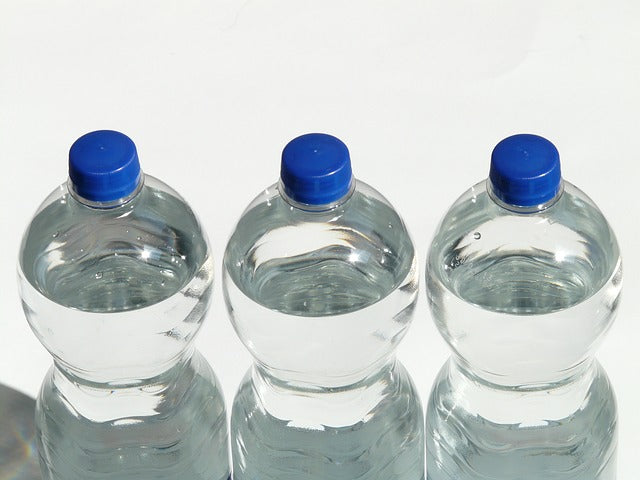
Research Links BPA to Prostate Cancer in Men
By Dan DeBaunShare
Researchers at the Cincinnati Cancer Center have discovered that concentrations of bisphenol A (BPA) in the urine of adult males could indicate prostate cancer, and that exposure to BPA, even at relatively low levels can bring about changes in the cellular structure of both malignant and non-malignant prostate cellular tissue.
Results of the study, which were published in PLOS ONE, 3rd March 2014, provide the first indication that BPA concentrations in urine can be used as a marker for prostrate cancer and may assist with detecting prostrate cancer in men. It further shows that exposure to BPA at low doses can disrupt cellular duplication cycles causing prostrate cancer to develop.
BPA is an environmental contaminant that is a known hormone disruptor which is used in the manufacture of rigid clear plastics commonly used in food and beverage containers, including plastic bottles that hold bottled mineral water. BPA has been associated with several health issues, including: neurological disorders; diabetes; as well as breast-, prostrate-, and other forms of cancer.
According to chief researcher Shuk-mei Ho, director of the Cincinnati Cancer Center, and a professor at the University of Cincinnati College of Medicine, studies conducted on animals show that BPA can cause prostrate cancer to develop, and while data on human subjects is scarce, humans are commonly exposed to this known toxin.
“Prostate cancer is the second most common cancer among men in North America, and one in six men will develop it over their lifetime,” says Ho. “However, the cancer is rarely diagnosed in men under the age of 40 with almost two-thirds of cases reported in men at age 65.”
According to Ho, more than 90% of US citizens are exposed to BPA, often on a daily basis. BPA is absorbed into the body via the skin, through inhalation, or from ingesting food or water contaminated with BPA toxins.
BPA is a hormone disrupter that copies thyroid and estrogen hormones, and also disrupts the immune and metabolic systems in the body. Consequently the impact on health is extensive, as has been proven in animals.
However, studies that link BPA exposure to increased cancer risk in humans are limited, says Ho. “Our study examined the association between urinary BPA levels and prostate cancer and assessed the effects of BPA on the initiation of centrosome abnormalities as an underlying mechanism promoting prostate cancer formation.”
Abnormalities of the centrosome – an organelle that plays an essential role in cell division – are often seen in various forms of cancer.
The researchers examined urine samples from sixty urology patients and found that BPA levels were four times higher in patients diagnosed with prostrate cancer than in patients that did not have prostrate cancer, and that this difference was higher still in patients under 65 years old.
The researchers also examined prostrate cellular tissue visually by the process of immunofluorescence, which allowed them to observe abnormalities of the centrosome or any abnormal growth patterns.
“Exposure to low doses of BPA increased the percentage of cells with centrosome amplification two- to eight-fold,” Ho says. “BPA is not a recognized carcinogen, and questions surrounding the mechanism behind the positive correlation of BPA exposure with prostate cancer have arisen.”
“Several studies have shown that centrosome amplification is a major contributing factor to chromosomal mutation in human tumors. We examined the centrosome profile of prostate cancer cells treated with BPA and found that treatment with BPA increased the number of cells with abnormal centrosomes.”
This research reveals a link between exposure to BPA and prostrate cancer that was unknown until now, and suggests that BPA could play a key role in cellular mutation and cancer progression.
Bottled water is one of the potential sources of BPA as this chemical can leach from the plastic bottles into the water, especially when transported long distances or stored for long periods of time. Home water filters provide a healthier alternative to bottled water, as they remove contaminants that are present in the water, yet do not contain BPA that can leach into the water inside the canister.
Note: The black berkeys do remove BPA from the water.
-
Regular price $234.00 USDRegular priceUnit price / per
-
Regular price $327.00 USDRegular priceUnit price / per
-
Regular price From $367.00 USDRegular priceUnit price / per
-
Regular price From $408.01 USDRegular priceUnit price / per
-
Regular price From $451.00 USDRegular priceUnit price / per
-
Regular price From $478.00 USDRegular priceUnit price / per
-
Regular price $332.50 USDRegular priceUnit price / per
$350.00 USDSale price $332.50 USDSale

Dan DeBaun is the owner and operator of Big Berkey Water Filters. Prior to Berkey, Dan was an asset manager for a major telecommunications company. He graduated from Rutgers with an undergraduate degree in industrial engineering, followed by an MBA in finance from Rutgers as well. Dan enjoys biohacking, exercising, meditation, beach life, and spending time with family and friends.
~ The Owner of Big Berkey Water Filters
















